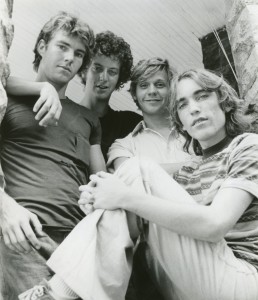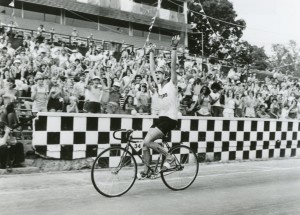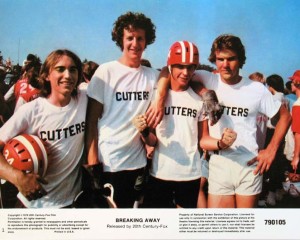by Barb Lentz.
The five movies Bob provided me from which to choose were these:
Breaking Away (1979)
Johnny Belinda (1948)
Moonlighting (1982)
This Could Be the Night (1957)
Village of the Damned (1960)
I chose Breaking Away because it was the most contemporary of the stories; I remember when it came out but I don’t remember ever seeing it. I also wanted to see Dennis Quaid when he was younger and really good looking!

Four friends just out of high school in Bloomington, Indiana, are facing adulthood while trying to hang on to their youth. They are all being pulled in different directions, yet still find the time and make the effort to maintain their friendship. The focus of the story is on Dave (Dennis Christopher), a cyclist who dreams of joining the Italian team, or at least training with them. His dream takes a nasty tumble when he finally meets the team face to face, shattering his illusions about racing and life forever. But the movie is also about the immutable bonds of friendship. No matter what happens to one of the guys, the others are there to support him. That is also true regarding Dave’s parents, who don’t understand his fascination with everything Italian, but love him anyway (and hope he’ll outgrow it soon).
The film does a great job depicting the small-city atmosphere, the divide between the wealthy college kids and the much poorer locals, and showing how time has changed the local dynamic. Dave’s father (Paul Dooley) is shown to have worked as a stone-cutter and is justly proud of having helped to craft the materials used to build Indiana University — now he runs a shifty used car lot. Times have changed.
For a long time the movie functions as a character study, following these four young men as they navigate toward true adulthood, making time for fun, looking half-heartedly for work, thinking about girls, discovering their personal interests. Then, rather suddenly, it becomes a sports movie as the boys enter a local bicycle race to compete against the college kids who despise them. That’s when it becomes an underdog story and the four friends have to pull together if they want to be taken seriously.

My top five aspects of the movie are:
1. The father-son relationship, which develops from genuine antagonism (on the father’s part) through tacit acceptance to, finally, love. Dave’s dad doesn’t understand his son, but he does try to communicate with him, and eventually he realizes how important cycling is to Dave, and abandons his used car lot to attend the climactic race. I also like that Dave’s mother (Barbara Barrie) was behind her son the whole time.
2. The underdog aspect of the story. These kids aren’t shown to be anything special — if anything they seem to be misfits in their milieu — and yet they represent everyone who isn’t affluent or privileged. As the big race takes place even the arrogant college kids learn to respect Dave’s stamina and heart. Even though it is Dave who carries most of the load, all of them contribute to the ultimate surprise victory.
3. The dichotomy between the college kids and the locals is dramatic and effective. It creates an “us vs. them” dynamic that works because it is so simple, yet the script explores the nuances that mark the divide. Mike (Dennis Quaid) is bitter because he doesn’t have the money to go to college to play football, so he raises hell, especially against the college kids who he perceives to have taken his chance. The race itself is a dividing point until the local kids are given a shot to compete in it; that they do well actually helps bring the community together.
4. I like how Dave embraces the Italian lifestyle, even to the point of adapting a silly accent and changing the cat’s name from Jake to Fellini. His attitude, and perhaps his belief, is that Italians are happy, so by adopting their culture, listening to opera, learning the language, he hopes to become happy himself. It is only when the Italian team shows its true colors that he finally stops trying to be what he is not, and accepts himself for who he really is.

5. All of the friends grow up in the big race. Dave pushes himself harder than ever, while the other three, who had hoped to sit back and enjoy watching Dave win the race single-handedly, have to jump in and do their best to salvage their chance. Even Mike, the most obstinate of them all, takes his turn for the sake of the group.
Is Breaking Away a classic? I think so. Its themes about friendship and sticking together are timeless, and we have not changed so much over the past forty years that this movie’s look or manner has dated too vividly. The story encourages self-respect and family ties, noting that others will see and value hard work and dedication. It is a good character study and an exciting sports story, all at the same time.
I’m also glad that it shows its bicyclists wearing helmets. I know from personal experience how devastating accidents can be, and I believe that helmets help keep people alive. Riders don’t like to wear them, but you cannot pause in the middle of an accident to put one on before you smash into something. Movies like this that show riders properly adopting safety measures and not making a big deal about it will, quietly and without fanfare, save lives.
BRL 10 December 2015.
Breaking Away (July 20, 1979) 20th Century-Fox
Directed by Peter Yates. Produced by Art Levinson and Peter Yates.
Written by Steve Tesich.
Principal Cast (character, performer):
Dave Stoller Dennis Christopher
Mike Dennis Quaid
Cyril Daniel Stern
Moocher Jackie Earle Haley
Mom Barbara Barrie
Dad Paul Dooley
Katherine Robyn Douglass
Rod Hart Bochner
Nancy Amy Wright
Mike’s Brother John Ashton
Suzy P. J. Soles
101 minutes. Widescreen (1.85:1). Color. Rated PG.
